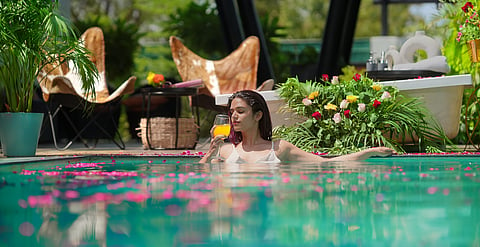
- Destinations
- Experiences
- Stay
- What's new
- Celebrating People
- Responsible Tourism
- CampaignsCampaigns
- SubscribeSubscribe
- Buy Now

In recent years, India's luxury travel has witnessed a significant transformation. From upholding traditional concepts of hospitality, it has shifted to adopt an ecosystem influenced by global standards in tandem with cultural authenticity and well-driven, mindful experiences. Speaking about the same phenomenon, Dillip Rajakarier, Group CEO of Minor International and CEO of Minor Hotels, shares his valuable insights in a conversation with Outlook Traveller.
The conversation touches upon the transition in question and how the brand is adapting its tactics to fit the newly-formed demands of Indian travellers. What with India ranking as one of the most promising yet complex markets, the interview attempts to broach key themes such as cultural sensitivity, hyper-personalisation, and the challenges of the upkeep of the equilibrium between global consistency and local relevance.
In the company of Rajakarier, Outlook Traveller takes a deep dive into the emerging psyche of the modern Indian luxury traveller, who seems no longer to be satisfied with the routine five-star comfort, and aches for meaningful, holistic exposure—from architectural authenticity to wellness traditions rooted in Ayurveda. In addition, competitive dynamics between global chains and homegrown hospitality brands is also raised, providing a rare, behind-the-scenes look into how international players are reimagining their India blueprint. As domestic luxury spaces turn increasingly novel and global, the conversation stands at the intersection of hospitality, making it an essential read for industry watchers, design enthusiasts, and cultural travellers alike.
Minor Hotels has a strong global presence, but India remains a complex market for international luxury brands. What have been your biggest takeaways about the Indian luxury traveller, and how do you see Minor Hotels adapting to their expectations?
India presents a unique and dynamic luxury market. My biggest takeaway is that Indian luxury travellers are very savvy. They are discerning, well-travelled, and seek experiences that are both enriching and personalised. They expect seamless luxury but also want to connect with the local culture in a meaningful way.
The high-end Indian traveller is also increasingly focused on wellness. Following the pandemic, people are more concerned about their health. They are not only looking to live longer, but to live better. Over the last year, Minor Hotels has launched a series of wellness facilities such as Layan Life at Anantara Layan in Phuket, and additional wellness offerings at Avani+ Hua Hin and Anantara Riverside in Bangkok. We recognise this evolving trend (among others) and are ensuring that we have the facilities and experiences to cater to our guests' needs.
With Indian travellers increasingly seeking hyper-personalised experiences, how does a global hospitality group like Minor Hotels balance standardisation with the need for deep cultural customisation in the Indian market?
Balancing standardisation with cultural customisation is a delicate but essential part of a hotel offering. As a global hospitality group, we understand that luxury travellers, regardless of their origin, share many core expectations. They seek consistent quality, impeccable service delivery, and personalised experiences. These are the cornerstones of our brand standards, and they remain non-negotiable.
However, we also recognise that India, like any other distinct market, possesses unique cultural nuances. This is where the art of 'glocalisation' comes into play. We maintain our global standards as a foundation, while empowering our hotel teams to adapt and tailor the guest experience to reflect the specific cultural context. Our hotel teams are the experts on the ground, understanding the subtle cues and preferences that make a stay truly memorable for our Indian guests.
Many international luxury brands struggle to establish a truly 'Indian' identity in their Indian properties. How does Minor Hotels approach this challenge?
At Minor Hotels, particularly with our Anantara Jewel Bagh Jaipur, we believe we've taken significant strides in seamlessly weaving Indian heritage into the entire experience (Outlook Traveller stayed at the property. Check out our review here). The property is deeply rooted in the history, vibrant colours, intricate design, and rich traditions of Rajasthan. We've meticulously incorporated local craftsmanship, architectural styles, and artistic expressions to create an environment that truly reflects the spirit of the region.
Do you see a future where your brands integrate more Indian design, service philosophy, or even wellness traditions like Ayurveda?
I believe our Anantara brand is a great example of a destination-driven brand. It's a core philosophy that guides our approach to hospitality. We believe that each Anantara property should be a reflection of its unique setting—a gateway to the local culture, history, and natural beauty.
The rise of Indian-origin luxury hotel brands has made the domestic market more competitive. What do you think global players like Minor Hotels can learn from homegrown hospitality brands?
India’s homegrown hospitality brands have done a wonderful job in establishing themselves and cultivating a deep understanding of the Indian luxury traveller. Their success is a testament to their intimate knowledge of the market and their ability to deliver experiences that resonate with local preferences.
How do you plan to differentiate your offerings in this evolving landscape?
We also believe that the Indian luxury market offers ample room for diverse players. There's a place for everyone—from established homegrown brands to international players like Minor Hotels—to contribute and enrich the hospitality landscape.
We aim to create a synergy where our global standards and resources are combined with a genuine appreciation for Indian hospitality and traditions. We believe this blend of global excellence and local sensitivity is what will allow us to thrive alongside the successful homegrown brands.
